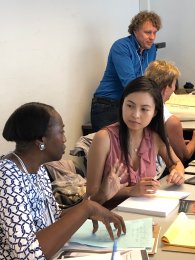2024 Fall Academy on Critical Thinking
In this academy for both new and returning participants, Drs. Linda Elder and Gerald Nosich illuminate how we design instruction and training to foster intensive intellectual engagement by every learner, in every class or program, every day. If you are an educator, you will leverage your new understandings in critical thinking to rethink your model of instruction. If you are a business or government leader or trainer, you will utilize critical thinking tools to transform how you view, organize, and execute your training and other work.
This academy is concerned to foster deep internalization of critical thinking in the long run and is designed for:
- educators and administrators at all levels of instruction,
- business and government leaders, and
- anyone desiring to advance their personal critical thinking skills, abilities and traits.
$580.00
Additional Information About:
2024 Fall Academy on Critical Thinking
As an academy participant, you will have the opportunity to work as a “student” in the Paulian Approach, or Paul-Elder Approach, to critical thinking. You will be tutored by our Senior Fellows as you work to internalize a rich, interdisciplinary concept of critical thinking and learn to apply it in your instruction and/or other professional work. Our Fellows will exemplify the disciplined thinking of master teachers, demonstrating and explicating the kind of content-filled reasoning that students and trainees must themselves come to internalize over time. We will work together in an intellectual community as you further develop your understanding of content as a mode of thinking that must be reasoned through critically, and as you come to see how this model of learning is important for living a reasonable, productive life.
Returning participants at the Academy will go deeper into the Paul-Elder Framework for Critical Thinking and learn to better apply its foundations in the classroom, in business and/or government, and throughout their lives. At times, they will work as an advanced group under the guidance of either Dr. Linda Elder or Dr. Gerald Nosich. At other times, they will work with new participants in a mentorship capacity during group exercises. This process will enhance knowledge of critical thinking foundations for both new and returning participants.
At this academy, you will:
- discuss essential ideas in critical thinking;
- develop and articulate your understandings of key concepts within your academic discipline or profession;
- rethink your “typical day” at work to foster deep learning in your students, employees, colleagues, or clients;
- reason through complex questions within your field, gaining insight into how you can help students, employees, colleagues, and/or clients do the same;
- see our Senior Fellows demonstrate ways of teaching and training that progressively build upon each other;
- engage in close reading and substantive writing while learning instructional-design strategies for both;
- receive feedback using intellectual standards to develop your understandings while you engage as “students” who are thinking through content; and
- (if relevant to your work) learn to better apply critical thinking in leadership and/or training in business, government, or education.
This academy offers a unique opportunity to work closely under the tutelage of Drs. Nosich and Elder in a small, intimate learning situation, much like disciplined Socratic schools one might envision. We will create a seminar-style Socratic learning experience together in a disciplined intellectual community, one of the sort that we would hope to create in our institutions and workplaces, and one which would be prevalent in fairminded critical societies.
By working alongside one another in this academy, participants across professions and with varying purposes, issues, and concerns can learn from one another as we all work to better internalize a powerful, robust conception of critical thinking and how to foster it in others.
